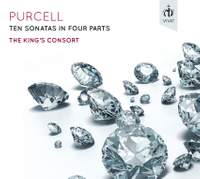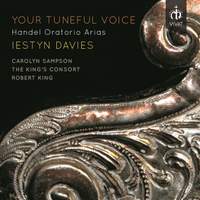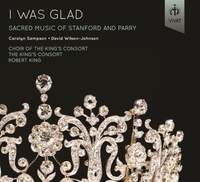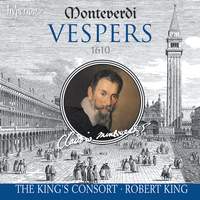Interview,
Robert King on Purcell's Ten Sonatas in Four Parts
 Robert King and his ensemble The King’s Consort are a byword for sensitive, historically-informed performances of early music. Robert is now at the helm of the independent record label VIVAT, which has released a number of new recordings by the Consort to consistent critical acclaim – here at Presto we were particularly taken with the label’s début disc of several orchestrated Stanford favourites that came out in Spring 2013.
Robert King and his ensemble The King’s Consort are a byword for sensitive, historically-informed performances of early music. Robert is now at the helm of the independent record label VIVAT, which has released a number of new recordings by the Consort to consistent critical acclaim – here at Presto we were particularly taken with the label’s début disc of several orchestrated Stanford favourites that came out in Spring 2013.
For their latest album, the Consort have turned to the purely instrumental works of Henry Purcell, with his set of Ten Sonatas in Four Parts; I caught up with Robert to get the inside story.
Most of VIVAT’s discs to date have been choral or vocal; what made you branch out into purely instrumental chamber music this time – and why did you go for the Purcell sonatas particularly?
Purcell and his music has always been central in my life, and in that of The King’s Consort – we’ve made more discs of Purcell than of any other composer. I have always loved Purcell’s sonatas: they are the most gorgeous music, combining French elegance, Italian vigour and English melancholy with harmonic daring, extraordinary contrapuntal technique and unique melodic inventiveness. I’d long wanted to record both sets of sonatas, and with my own label, repertoire meetings are very brief and always unanimous!
What makes Purcell’s music stand out, and this is especially borne out in these ten, delicious sonatas, is that ineradicable vein of melancholy: even at the most extrovert moments, there is a sense of impermanence, of fleeting glory, that things will not last. We see that in the tragedy of Purcell’s early death, we see it politically in the later 17th century, and we see it musically – that brilliant flowering of home-grown, top-quality British music does not return again for 200 years.
Do you think these sonatas have to be taken simply as individual standalone works, or do you see the whole set as forming a kind of musical unit as well?
Whilst of course you can perform individual sonatas alone – and all of them work wonderfully – there is something utterly compelling about performing all ten in a sequence. The 1697 publication makes no attempt to create any such order, so I spent many hours trying to create an order that I believe Purcell, had he been publishing these works himself (that task fell to his wife after his early death) might have followed. What I’ve come up with is conjectural, but it does have a flow in terms of key structure, mood, progression, and emotion, and is also based on good historical evidence too.
The word “melancholy” seems to be quite a common one when talking about the smaller, more intimate works of this period; how do you feel these sonatas compare to, say, the lute-songs of Dowland on that front, especially given that they are wordless?
If you can only use one word to sum up Purcell’s music, “melancholy” has to be it. Wherever you look, his music is suffused with melancholy, even at the most opulent moments. And it’s not only in the music where you can sense this: there’s a less-well known portrait of Purcell which shows him with a most sensitive face and eyes, especially, that seem to show the same sadness that comes out time and time again in his music. He was greatly influenced by music of his forebears, and that wistfulness that you hear in Dowland and his contemporaries was clearly significant in Purcell’s musical development.
Given the way in which Purcell’s style synthesises so many European schools of composition, do you think a French ensemble or an Italian one might present it differently from The King’s Consort – and do you feel the multinational nature of the lineup on this disc helps to avoid an overly “English” attitude to performing Purcell?
Despite the influences we find in Purcell’s music of France and Italy, his music cannot be anything but English – just as the music of Elgar, Vaughan Williams or Finzi also sounds so totally English. I think it’s great that there is so much variety in how people perform on period instruments nowadays, that, say, an Italian group can sound so very different to a German group: vive la difference!
TKC’s performers are a very international group – we often take the stage with performers from a good dozen nations, and rehearsals can find simultaneous discussions in Dutch, German, Catalan and Australian – but that’s simply because I work with only the very best performers. But I hope that my overall stamp comes across in the performances – I hope you can switch on the radio and say “surely that’s TKC”.
Can you give us any clues as to what might be next in the pipeline – more Baroque instrumental gems, or a return to the human voice… or maybe something more contemporary?
Pleasingly, recordings in all of those categories are planned! Next up for VIVAT for the early Autumn is our wonderful principal cellist Viola de Hoog playing the six Bach suites (that’s in final edit this week). We’ve got plans for two more major English Romantic discs (we are busily raising the huge finance that these discs need); before those there’s a really exciting long-term vocal series which should go into the studio for its first volumes later this year, and we aren’t forgetting our Baroque roots either. I’m full of ideas, and it’s still very exciting to be running my own label, to be able to head off in unusual directions, to take a few risks, and most important of all, to work with some of the finest musicians in the business.
The album was released on 23rd June on VIVAT, and is available now to order.
Available Formats: CD, MP3, FLAC, Hi-Res FLAC
Other recordings by Robert King and The King’s Consort
Countertenor Iestyn Davies showcases some of the finest arias from Handel's oratorios – featuring two duets with soprano Carolyn Sampson and the sublime Eternal source of light divine with trumpeter Crispian Steele-Perkins.
Available Formats: CD, MP3, FLAC
As hinted above, this is Stanford as you've never heard him before – time-honoured staples of the English evensong service (the Canticles in B flat, C, G and A) gloriously reborn in full orchestral versions by the composer, and complemented by Parry's uplifting ceremonial works.
Available Formats: CD, MP3, FLAC, Hi-Res FLAC
A triumphant culmination to King’s series of Monteverdi’s sacred music, this stunning performance of the 1610 Vespers was simultaneously praised for its authenticism and for its ability to rise above the narrow concerns of historical accuracy.
Available Formats: 2 CDs, MP3, FLAC






